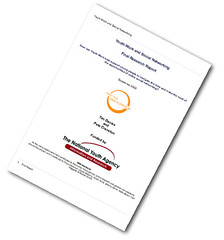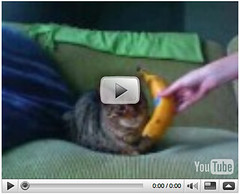 Earlier this year I facilitated a pilot online course for Oxfam GB called Video Change. The course, which in the end ran over 8 weeks, sought to equip existing Oxfam activists with the skills for making video for the web.
Earlier this year I facilitated a pilot online course for Oxfam GB called Video Change. The course, which in the end ran over 8 weeks, sought to equip existing Oxfam activists with the skills for making video for the web.
The course itself didn’t quite produce the level of activity and video making that we had hoped for, but it has produced a lot of learning which will feed into future work by the Activist Support & Campaigns teams in Oxfam GB to provide online learning and support opportunities for activists and campaigners.
Below you can find a few assorted reflections and key shared learning from the course content and process of running the course:
What makes a great campaigning video?
In Week 2 of Video Change I invited participants to pick 5 or so videos that they thought were great examples of online video and video for campaigning.
Of course, we didn’t expect there would be consensus on what makes a good campaigning video – but we were struck by just how diverse the selections that were made were – ranging from 15 minute documentaries through to 30 second clips from the TV.
You can see some of the videos that were selected below or in this VodPod:
And here some some of the participants reflections on the online campaigning videos they chose:
“With the volume of videos on the web if it doesn’t grab me within 5 secs and hold my attention i’m going to switch off. The most popular clips are almost always funny so 4 out of the 5 videos here are funny.”
“It had a non-intuitive approach to the issue, which should hopefully be engaging to people who “get” environmental issues, but who don’t want to spend a lot of time being preached to – so the video is short, and leaves you waiting for the punchline. The more I think about it, the more it seems to me that a good video is quite a lot like a good stand-up comedy gag!”
“What I like about this is, that it’s about a simple activity that anyone can do to make a difference for people living in poverty.To my mind, this is very empowering. It’s simple in style too, although I suspect the editing wasn’t as straightforward as it looks. No frills: the presenter believes what she is saying, and says it. Brilliant.”
“I felt the ‘call to action’ at the end was a bit weak. It needed something to really tell me what I can do next.”
What does all this mean for those creating campaign videos?
Whilst the participants in Video Change were a very specific group of already engaged online video consumers – there is some value in reflecting upon their choices of video and what it could mean for campaigners and NGOs seeking to use video as part of their activist work. In particular, we found:
- There is no one format or style of video that will appeal to everyone – obvious of course – but it does have interesting implications for NGOs. A number of videos participants chose during the course were remixes of other videos – or were video memes. Instead of trying to create a catch all video with wide appeal it may turn out best for NGOs to create clips which can be remixed by volunteers and supporters to appeal to different audiences.
- Most videos benefit from a clear call to action – Some of the videos were valued as inspiring in their own right – but many failed to provide a clear sense of how someone could respond to what they had just seen. Simple, down to earth, suggestions of how to respond to a video on the last few seconds can increase impact.
- Get attention and then get the message across (in that order) – Videos that focussed on getting people’s attention first, and then getting their message across second, seemed to be more popular than those which put their message up front. The most popular videos tended to take people on a journey, even if only a 30 second journey.
- Activity packed edits got more attention – When videos were reporting on a recent campaigning event or activity then including lively music and regularly changing camera angles (using B-roll footage) kept people’s attention for longer.
If you’ve got other tips for creating campaign videos – do share those in the comments below.
Running an open or closed course
 Whilst my original pitch for the course was to run an open learning project, in the end we decided to try and closed pilot – working with existing Oxfam activists. Part of the thinking was that this way we could focus on the video campaigning skills, rather than spending time exploring the issues Oxfam campaigns on as well.
Whilst my original pitch for the course was to run an open learning project, in the end we decided to try and closed pilot – working with existing Oxfam activists. Part of the thinking was that this way we could focus on the video campaigning skills, rather than spending time exploring the issues Oxfam campaigns on as well.
Clearly open courses, like the Work Literacy social media course currently running, have a lot more potential for attracting large numbers of participants and vibrant discussions. However, it’s worth noting that these open courses are very much about learning to apply to one’s individual life and work – rather than to apply in support or a campaigning organisation.
Our conclusion from Video Change was that the benefit of running more open courses in the future outweighs the risk of some participants using their new skills to go ‘off message’ – but it’s worth recognising that many big NGOs are still only starting on the path of understanding that they need to let go of a degree of control over message in order to see greater returns of action and engagement.
On a technical level – facilitating the course using Ning set to be a private network was a little tricky – as you loose access to the open RSS feeds which can make it a lot easier to follow what is going on across the network.
Online training or online learning
The idea which inspired me to suggest an online course to the Oxfam team was my participation in the 31 days to a better blog challenge in 2007. In hindsight it is clear that that was an ‘online learning’ project, rather than an ‘online training’ project – and Video Change ended up being a slightly confused combination of the two.
Working in a closed pilot with participants, most of whom didn’t have their own established social media spaces online (blogs, twitter etc) and many of whom were not familiar with reflective learning online, meant that I ended up in a teaching role rather than the learning facilitator role I had hoped for. Being clear about whether a project is about online teaching (needs a classroom style online environment, set inputs and clear plans) or learning (needs a network and reflective environment, inputs and resources which respond to participants needs).
Screen-casts are a great tool

Each week of the course had one or two video inputs (perhaps one was a presentation) and a one-page guide introducing that weeks activities and challenges (I’ll share some of the Guides here soon…). However, I quickly found myself making extensive use of Jing to create screen-casts to explain particular steps involved in creating, sharing or promoting a video – and these narrated screen casts were really well received.
With the ease of creating Screen-casts with a tool like Jing they are something I’ll be aiming to add more often to my training toolkit.
The future of a Video Change model?
As a pilot Video Change taught us a lot. It’s unlikely to run in the same format again – but hopefully we’ll soon be able to share many of the course resources more widely – and the idea of online learning for activists and campaigners will emerge in a slightly different form in Oxfam soon.
 Jon Jolly has shared
Jon Jolly has shared 





 I’ve pitched a
I’ve pitched a 

 I've just been interviewed for an article about how blogging can be used to promote positive activities. Using blogging as part of promoting youth work was only one part of one of the
I've just been interviewed for an article about how blogging can be used to promote positive activities. Using blogging as part of promoting youth work was only one part of one of the